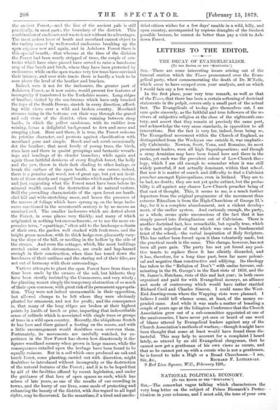LETTERS TO THE EDITOR.
THE DECAY OF EVANGELICALISM.
[TO THE EDITOR OF THE "SPECTATOR']
SIR,—There are some interesting issues arising out of the funeral oration which the Times pronounced over the Evan- gelical party, when commemorating the death of Dr. M'Neile, which seem to have escaped even your analysis, and on which I would fain say a few words.
In the first place, your very true remark, as well as that of the Thnes, that there has been a certain softening of doctrinal statements in the pulpit, covers only a small part of the actual fact. The Evangelicals of to-day give themselves out, I am sure quite sincerely, as the faithful and true followers of the re- vivers of subjective religion at the close of the eighteenth cen- tury, and assert that they remain at precisely the same post, and acknowledge the very same standards, in opposition to all innovations. But the fact is very far, indeed, from being sc. The Evangelical movement within the Church of England, as distinguished from the Wesleyan one outside it, was emphatic- ally Calvinistic. Newton, Scott, Venn, and Romaine, its most prominent leaders, were all high Supralapsarians ; and though a stray Arminian may have been found here and there in the ranks, yet such was the prevalent colour of Low-Church thec- logy, which I am old enough to remember when it was still widely powerful, if not actually dominant, within that school. But now it is matter of search and difficulty to find a Calvinist preacher amongst Episcopalians, even in Ireland. They are to be had, no doubt ; they are not yet quite extinct, but the proba- bility is all against any chance Low-Church preacher being of that cast of thought. This, it seems to me, is a much further departure from the original programme of the movement than extreme Ritualism is from the High-Churchism of George IL's day, for it is a complete abandonment, not a violent develop- ment, of the earlier system. And curiously enough, the party, as a whole, seems quite unconscious of the fact that it has simply passed into Zwinglianism out of Calvinism. There is another doctrinal fact, less remarkable, but equally true, which is the tacit rejection of that which was once a fundamental tenet of the school,—the verbal inspiration of Holy Scripture. This has rather been forced upon it than voluntarily made, but the practical result is the same. This change, however, has not been all pure gain. The party has not yet found any posi- tive tenets to replace those it has silently discarded, and it has, therefore, for a long time past, been far more polemi- cal and negative than constructive and edifying. Its theology has taken to the " Religion of Don't " with undue fervour, cul- minating in the St. George's in the East riots of 1859, and the St. James's, Hateham, riots of this and last year; in both cases organised and paid for with Evangelical moneys, an alliance and mode of controversy which would have rather startled Richard Cecil and Charles Simeon. I could name the West- End drawing-room where the Wapping riots were planned. I believe I could tell whence some, at least, of the money ex- pended came. And while it was made a matter of boasting a couple of years ago at the Islington Conference that the Church Association grew out of a sub-committee appointed at one of the anniversaries, I have never yet seen or heard of one word of blame uttered by Evangelical leaders against any of the Church Association's methods of warfare,—though it might have been thought that some at least would have found them dis- tasteful. This may help to account for a complaint I heard. lately, as uttered by an old Evangelical clergyman, that he cannot now get a gentleman of his own views as curate, and that as he cannot put up with a curate who is not a gentleman, he is forced to take a High or a Broad Churchman.—I am,


































 Previous page
Previous page